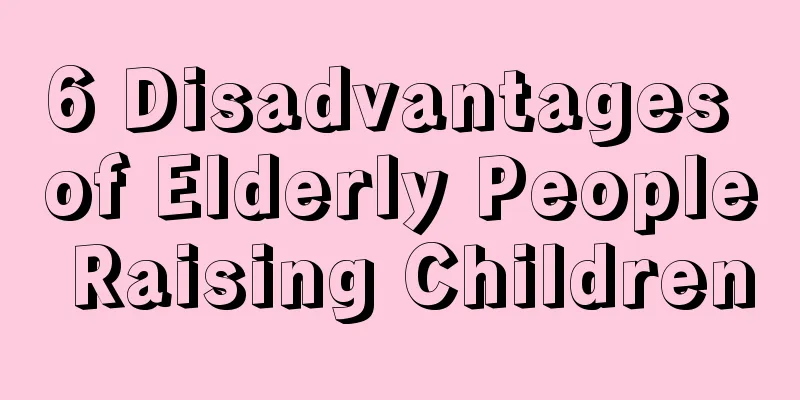6 Disadvantages of Elderly People Raising Children

|
Society is developing rapidly, and the educational views of the two generations have suddenly widened the gap. It is difficult for the elderly to keep up with the pace of young people in terms of child-rearing. Next, should the children be left to the care of the elderly? This has become the most headache for young people. In fact, there are both advantages and disadvantages for the elderly to take care of children. The elderly and young people love children in the same way, but the excessive love of the elderly can easily mislead children. Here are a few examples: 1. Love & Dote Most children nowadays are only children, so they naturally become the "king" of the family. Family members love them very much, especially the elderly who treat them as "treasures in their palms". They are easy to accommodate children, and will try to satisfy their needs unconditionally as long as they have them. Even if the children make unreasonable demands, the elderly will follow them without hesitation. Gradually, the children understand their position in the family. They are self-centered in everything, and will lose their temper or cry to threaten the elderly to meet their own demands if they fail to achieve their goals. In the end, the elderly's love turns into spoiling. Doudou was like this when he was still in his hometown. He had only one grandson, and his parents-in-law loved him very much. They gave him whatever he wanted, and the two old people were always being directed by Doudou. Doudou asked for this and that, and threw them away within two minutes after getting them. Once he threw them, the old people would be busy picking them up. Doudou played with toys when he was happy, and threw them away when he was unhappy. He was quite self-centered. The old people were used to this way and had no complaints. Because, as long as they did not obey Doudou, Doudou would sit on the floor and cry, make a fuss, and throw things around. After we took Doudou to our side, correcting his bad habits became our biggest headache. In fact, children are very smart and they are good at identifying who is easy to bully. This is what we often call "following the wind". We began to constantly guide Doudou and reason with him, letting him know that it is not feasible to be unreasonable and that it is wrong to get tired of the old and fall in love with the new. Next, as for toys: we only left two toys for Doudou to play with and put away all the other toys. Every time Doudou was not playing, he was required to learn to put away his toys. Only after he put away the toys could he do the next thing. When Doudou gets angry and wants to throw things, we immediately shout "stop" and teach him that this way of venting is wrong. If he does something wrong, he should remember not to make the same mistake next time. If he is not satisfied, he should think about whether he has excessive demands. When Doudou threatens us by crying, we should also shout "stop" immediately, tell him that crying is not the best solution, and guide Doudou that he can actually calm down and think about whether there is a better way to fight for what he wants. For example, he can first meet his parents' requirements and then meet his own needs. Slowly, Doudou began to realize the environment and role he is in. He must now give up his previous concepts and accept the new environment and education methods. Now many people say Doudou is a sensible child, but you only see him now. He was not like this before. He was what we often call a "bad boy". But what we want to see is the present and the future. I hope Doudou can become more and more brilliant. 2. Superstition and Misconceptions Elderly people are more superstitious than young people. Especially the elderly living in the coastal areas of southern Fujian are particularly superstitious. My mother-in-law is one of them. In fact, superstition can give the elderly a sense of sustenance, but being too superstitious can easily lead to mistakes. I remember when Doudou was more than two months old. One night, Doudou woke up in the middle of the night and started crying non-stop. No matter how I coaxed him, it didn't work. I felt distressed and anxious and didn't know what to do. At this time, I saw my parents-in-law got up and walked out of the room. But the strange thing was that I didn't see my mother-in-law come to see why Doudou was crying. At that time, I was very depressed, "Where did my mother-in-law go?" In the end, I had no choice but to call my mother's home to ask my mother what to do? My mother taught me some coping measures. Doudou finally calmed down. After Doudou fell asleep, I walked out of the room and found that my mother-in-law had been kneeling in front of the altar after getting up and praying to God to bless Doudou. Fortunately, Doudou had me by his side, and fortunately, Doudou's crying was just a small problem, otherwise I would have made mistakes if I didn't completely trust my mother-in-law. 3. Intergenerational Education The starting point of the elderly loving their grandchildren is the same as that of parents loving their children. But the ways of loving them are quite different. The elderly love their grandchildren with a tendency to be "kind", while parents love their children with a tendency to be "strict". In many cases, the elderly will also protect and block the proper discipline of their children, which eventually turns into a battle between the mother-in-law and the daughter-in-law. When Doudou was still in his hometown, the old people were very obedient to him. But when Doudou was with us, we completely changed Doudou's original lifestyle and habits. At this time, the old people felt that our way of education was too unfair to little Doudou, and they felt sorry for their grandson. So, they began to nag us all day long, and when educating Doudou, they simply picked up Doudou and walked away. In the end, we realized that the old people are actually like children sometimes. Therefore, before educating children, we must first change the old people's concepts. Only when the whole family is united can we educate Doudou well. 4. Guidance & Coping When the elderly watch cartoons with their babies, they are just "accompaniers". When the baby is watching cartoons, the elderly sitting beside him either dozes off or gets up to do other things. When parents watch cartoons with their babies, they will explain and guide them. One day, Doudou was watching "The Adventures of Little Carp" in the living room with his grandfather sitting beside him. Doudou asked while watching: "Grandpa, what is this fish called?" Grandpa immediately replied: "Big fish." "What about the red fish?" Doudou continued to ask. "It's also a big fish," Grandpa replied without thinking. Doudou began to get angry: "No, you are wrong, it's not a big fish, it's a shark." "Grandpa, do you know what sharks eat?" Doudou continued to ask. "Sharks eat disobedient children," Grandpa said half-jokingly. Doudou was stunned for a moment and asked: "Have disobedient children been eaten by sharks?" At this time, Doudou's father came out of the room to make up for Grandpa: "Sharks eat slow-swimming small fish, so when small fish see sharks, they must run away or try to avoid sharks. If people encounter sharks while swimming, they must pretend to be dead. Sharks don't eat dead people. Pretending to be dead means not breathing. When the sharks swim away, people must leave and go ashore quickly." Doudou didn't understand Doudou's father's reply, but he was very satisfied with such a reply. 5. Help & Dependence Whatever the child can do, try to let him do it by himself. This is the only way to cultivate the child's independence and self-care ability. However, in the eyes of the elderly, children are just children, and they like to help the children complete everything. Let the children get used to the life of having food and clothes provided for them. When Doudou was still in his hometown, he was playing with cars in the living room on the second floor. They were two small scooters. After playing for a while, Doudou wanted to play downstairs, so he told his grandfather: "Grandpa, please help me take the cars to the first floor, I want to play downstairs." Without saying a word, his grandfather grabbed the cars and went downstairs with Doudou. After playing for a while downstairs, Doudou wanted to go upstairs to play, so he said to his grandfather again: "Grandpa, please help me take the cars, I want to go upstairs to play." Grandpa grabbed the cars and followed Doudou upstairs. They went up and down several times, and Doudou still found it interesting. I came back from the market and saw this, so I stopped Doudou immediately. I said to Doudou: "Grandpa Doudou is old, you can't torment him like this. The car is so small that you can hold it by yourself. What if you turn it around and make Grandpa dizzy and fall down?" Doudou stopped immediately, looked at me and then at Grandpa. Grandpa was tired and sat on a chair beside him and said: "It's okay, children are like this." I squatted down and pulled Doudou to my side and said: "Doudou, you see Grandpa is so tired that he can't even walk. How about this, baby, mommy will play with you toy cars. In fact, it will be more fun to find a fixed place to play with toy cars." Finally, Doudou went upstairs with me, and we started playing on the balcony on the second floor. 6. Catchphrases and bad habits In my hometown, influenced by the place where I live and the surrounding environment, the elderly are used to using some catchphrases in their speech. For example: "lunatic", "fool", "go to hell", "really stupid", "idiot", etc. In the eyes of the elderly, these words are words that they are reluctant to curse at familiar people, that is, in their eyes, these are not swear words. However, when your baby also casually uses these sentences in front of your parents or relatives and friends, you will feel extremely ashamed, and others will mistakenly think that there is something wrong with your family education. Therefore, for children: we constantly teach them not to use these catchphrases and tell them the general meaning of these catchphrases. For the elderly: let them cooperate with us and try to use fewer catchphrases in front of children, and when we educate children, they should not stand up to testify against us. Finally, let the children correct their bad habits. Although there are some disadvantages when the elderly take care of children, they are definitely more careful and patient than young people. The starting point of the elderly is definitely good. It's just that they love their grandchildren too much. In the end, excessive love leads to spoiling and misleading the children. However, we can't stop the elderly's way of love in person because of this. Find an opportunity to sit down with the elderly to discuss the plan of educating children, and ask for their opinions before improving it. With a perfect plan, I don't believe that I can't educate the children well. |
<<: 7 dietary details to keep children away from myopia
>>: How to eat avocado for babies
Recommend
Can girls grow taller after puberty?
Children nowadays are very tall because the livin...
Causes of oral thrush in children
Many mothers may not know how to prevent oral thr...
How to treat balanitis in children?
Parents generally pay more attention to the genit...
How should children's asthma be treated?
Asthma is a very common respiratory disease, and ...
What medicine should children take for cold and cough
Babies are very likely to develop coughing sympto...
Don't put this in your child's room.
With the improvement of modern people's livin...
Causes of shortness of breath in children
If children's shortness of breath is not caus...
Causes of black teeth in children
In life, many children often encounter the proble...
What is the normal armpit temperature for young children?
What parents fear most is their children getting ...
What to do if your one-year-old baby has thrush
If a one-year-old baby has thrush, you should pay...
Why is the baby scratching his scalp? Scratching scalp, baby, cause
Many babies always scratch their scalps in the su...
What to do if your baby has a fever and nosebleeds
Colds and fevers are very common diseases, especi...
Causes and suggestions for milk discharge from baby's nose
For newborn babies, breast milk plays an extremel...
What to do if a child with cerebral palsy drools
Cerebral palsy is a relatively serious disease, a...
What are the best ways to reduce fever in babies?
It is a common phenomenon for babies to have a fe...









